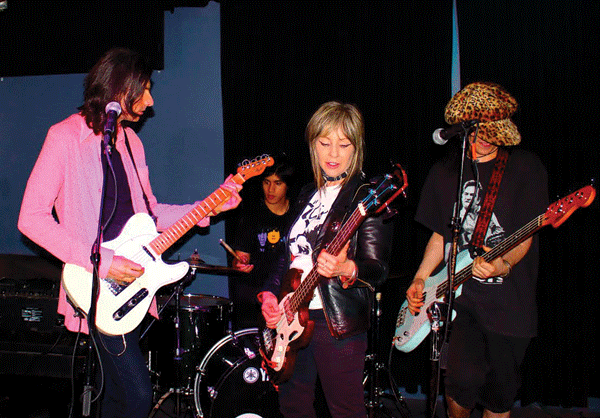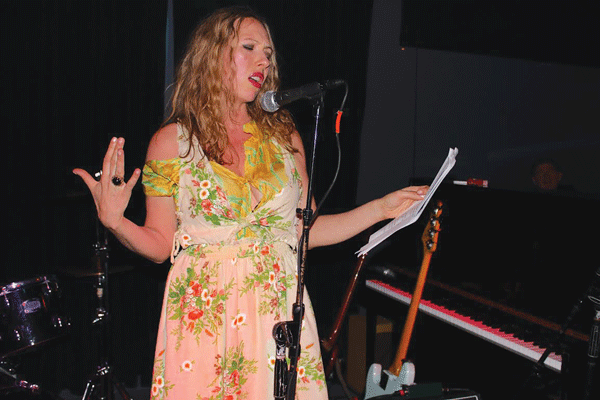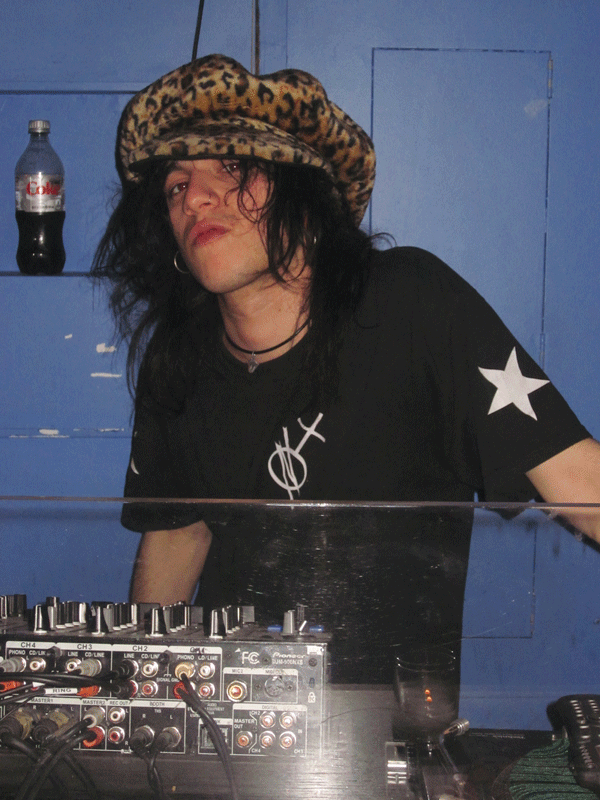
BY PUMA PERL | Anyone remember the song, “Poetry In Motion,” recorded by a guy named Johnny Tillotson? The opening lines are
Poetry in motion, walking by my side
Her lovely locomotion keeps my eyes open wide
Motion and locomotion — a natural connection between words and music. Any good songwriter feels it, and the best poets develop their own rhythms whether they take it to the stage or leave it on the page. So why do so many of my rock and roll friends believe that they don’t “like” poetry, even with the likes of Patti Smith, Bob Dylan, Leonard Cohen, and Jim Carroll spinning around on their turntables? (Yes, the hard-core crowd loves its vinyl.)
For many of us, our first exposure to poetry took place in the schools. We were force-fed stanzas and forms, some of it in Old English that we didn’t even understand — and it definitely didn’t rock. It didn’t even move. I remember memorizing pieces like “Invictus” and “In Flanders Field.” The first is about awaiting death. In the second, poppies cover the graveyard. Words to rock a 12-year-old heart. Sure, there was always one cool jeans-clad English teacher who included Dylan in the syllabus, but I never had a single class with that dude. I’m not sure if he even existed in my working class, inner city school. The closest I got was a middle-aged woman with shoe polish hair. It was rumored that she’d been observed wearing a black jumpsuit and reading poetry to some guy in a Village coffeehouse. Maybe it was the Dylan dude.
On the Bowery, the sum of what was and what will be
So how did I find poetry anyway? The short answer is that I was an undercover nerd who sneaked out to libraries in neighboring areas where nobody would see me. I’d watch the F train from my window and eventually started riding it randomly, often winding up in the Eighth Street Bookshop, located on, of course, Eighth Street, in the heart of the Village (back in the days when it still had one). Upstairs, in the poetry section, there were these little City Lights Books that could fit right into your pocket — just a theory, of course, although I’m pretty sure the statute of limitations has passed. Ginsberg, Corso, Diane DiPrima. Ferlinghetti. Motion. I read all of the Beat poets, and started to hear those bongos and saxophones between the lines. Late one school night, I accidentally tuned in to Symphony Sid on my little clock radio and discovered Billie Holiday singing “Willow Weep for Me.” That was a pivotal moment for a dorky, yet rebellious, seventh grader.

There are as many ways to combine spoken word and music as there are ways to create poems. On June 20, I checked out a show a young friend, Sam Hariss, had put together at Bowery Electric’s Map Room (327 Bowery, btw. Second & Third Sts.). Sam deejays the Friday Happy Hour, which he renamed “Wham Bam Raff & Sam” — Raff being the gorgeous bartender, Mary Raffaele, a founding member of the late ’80s/early ’90s all-girl metal band known as Cycle Sluts from Hell. Sam plays bass in several bands, including Kee Cartel, led by Jeff Ward who is also a prolific writer and the author of several books, including “Parasite: Joyous Flashbacks Amidst a Crystal Meth Nightmare.” Jeff suggested that a few poets be invited to the gig, which also included The Nuclears, Stiletto, and the Bowery Boys. After a stripped down set by The Nuclears, and a rocking one from Stiletto (which included a cover of “Dead Flowers” with guest vocals by Jeff Ward), poet Tessa Lou Fix opened for Kee Cartel. She allowed her still, ethereal presence to capture the audience before proceeding with a slow, thoughtful delivery of two pieces. The longer one, “Organic Heroin,” set up an original song, “Transatlantic Tales,” written by Jeff Ward. Almost hypnotically, she told of “women on the street, tied to their ankles…open-hearted, crying for it.”

It’s that open-hearted thing that hit me the hardest. Her piece not only provided a contrasting segue to the driving beat provided by two bass players (yes, two), but complemented the sensibilities of the Jeff Ward songs as well as the camp/glam vibe. An interesting aside is that Tessa actually knows the subjects of the opening song, but, according to the songwriter, she “doesn’t know she knows.” The members of Kee Cartel are Ward, Hariss, and Cynthia Ross, of The ‘B’ Girls. Russ Brazello of Stiletto and the Bowery Boys sat in on drums.
Several songs in, poet Verless Doran stepped into the corner of the room, wearing his usual Bud Lite baseball cap and jeans. The poem he chose is called “7:30 AM Pines Motor Lounge Blues.” Doran’s Tennessee twang and killer words entitle him to call almost anything he writes the blues, especially when it’s a country boy’s love song. He is equal parts storyteller, poet, and hillbilly from hell. This one brings you close to tears, as he describes the hooker “hiding from old Leadbelly…the girl who looks like the blues for real…she’s the quiet girl, used to sit behind you in homeroom.”
This room filled with rockers quieted as soon as he began reading and seemed to join in a collective sigh followed by an explosive cheer as he ended and the band immediately launched into a new tune written by Jeff Ward, called, appropriately, “How Could You B-Girl.” Following their set, I honored a last-minute request from Jeff and Sam and stepped up to the podium and performed a piece called “The Perfect Man.” Again, the crowd immediately fell silent and paid attention to the reading. It’s a funny piece, and they laughed in all the right places — giving the next band, The Bowery Boys, a chance to set up, and providing a segue into their set of original work by leader/guitarist Joff Wilson, as well as some covers. Joff’s lyrics paint pictures through color and image — “Rochester Grey” is a good example — and they were the perfect choice to close a night of poetry and rock and roll.
I caught up with Jeff Ward to talk about his thoughts on poetry, rock, and the show. “Songs are my poetry,” he said, noting, “I always add the music later. Music gets in the way of really hearing the words at times. Although I like extended readings, it also works well to have short bursts of poetry and music to switch attention and mood.” Asked what his dream spoken word/music set would be, he replied, “My fantasy would involve Mumia Abu Jamel and The Last Poets…and I’d tap along on bongos.” Hey now!
As the night ended, I stood outside for a while with Verless Doran. Even leaning against the rail, he towers over most people — and that boy can lean. We were occasionally interrupted by members of the audience, as well as by residents of several nearby shelters asking for change. The upscale Bowery denizens hurried by. “I like the poetry that’s not what people study in high school,” said Doran. “People back home, they don’t read Shakespeare.” By the next day, he had a new poem illustrating what he meant and describing his lean: “Bonnaroo on the Bowery.” This is a short excerpt from the opening stanza:
this dude came
pushing his bicycle up to me
outside the Bowery Electric
where bands and poets play
for peanuts, and less
for smiles
and the way a foot taps
against a wood floor
sticky with a thousand
spills and secretions
the way a head sways
hypotized
the way arms swing like
drunk angels toward
rusted pipes and wires
dangling overhead
like old clockworks
And he concludes:
and the sound of coming
was always more like the blues
than rock and roll
and the lights went down once more
and came up again
just like they always do.
Just another night on the Bowery, sort of what it used to be, and a little like it is going to be. An 18-year-old plays in three bands, including one with a former B Girl. A 22- year-old bass player curates and deejays the show, and also plays in three bands. A metal goddess serves up drinks. The lead guitarist of Kee Cartel writes novels as well as songs and the Bowery Boys’ lead guitarist paints pictures, both metaphorically and literally. The poets photograph the session and this writer multi-tasks as best she can throughout the evening.
And the lights went down once more.
* * * * * *
“The Wham Bam Raff & Sam” Happy Hour takes place every Fri., 5-9 p.m., at the Bowery Electric (327 Bowery, btw. Second & Third Sts.). Live music in the Map Room is often included, free of charge. On July 11, The Sad Bastards of Brooklyn — a side project of vocalist Charlene McPherson and guitarist Mo Goldner of the New York City band Spanking Charlene — will perform an acoustic set of covers of “some of the saddest songs ever” by artists including Bob Dylan.
Puma Perl is a widely published poet and writer, as well as a performer and producer. She is the author of two chapbooks and two full-length poetry collections: “knuckle tattoos” and the recently published “Retrograde” (great weather for MEDIA press). “Puma Perl’s Pandemonium,” a quarterly event, brings spoken word together with rock and roll. As “Puma Perl and Friends,” she performs regularly with a group of excellent musicians. They will appear at Sidewalk Cafe (94 Ave. A, at Sixth St.) at 10 p.m. on July 25. Produced by AHPresents, it is a second book release party for Retrograde (bands start at 7 p.m. and include the Downtown Pidgeons, the Joey Kelly All-Stars, Red Gretchen and Dirty & Naughty). No cover, no minimum, all ages welcome. Perl’s video links and event updates can be found at pumaperl.blogspot.com.



































